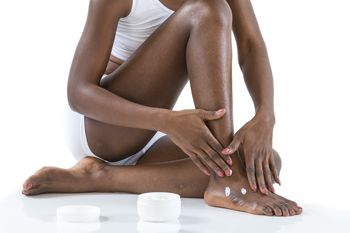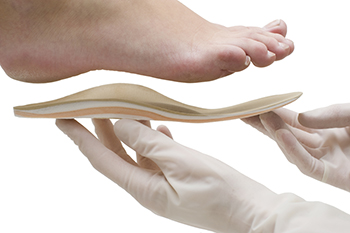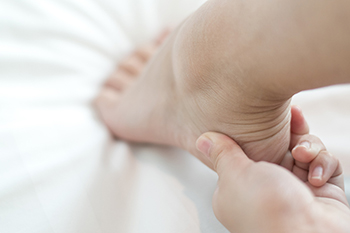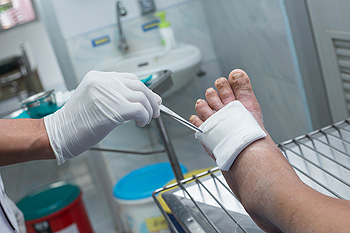Connect With Us
Blog
Items filtered by date: May 2023
Simple Methods to Make Your Feet Feel Good

Some people pay little attention to their feet until foot pain develops. When an everyday foot care routine is practiced, the chances of incurring painful foot conditions may be reduced. Begin with washing and drying the feet daily, then apply a moisturizer. The daily use of moisturizers may help prevent cracked heels from occurring. Ingrown toenails may be avoided when the nails are trimmed properly, which means cutting them straight across instead of in a curved fashion. All-day comfort for the feet and body may be achieved when the right size shoes are worn. Determine your shoe size using a Brannock device, and purchase shoes at the end of the day when the feet are at their largest. The feet can become stronger when daily foot exercises and stretches are performed, possibly making it easier to complete daily activities. If you would like additional techniques about every day foot care procedures, it is suggested that you confer with a podiatrist who can provide you with the correct tips.
Everyday foot care is very important to prevent infection and other foot ailments. If you need your feet checked, contact David A. Edmonds, DPM from Advanced Podiatry Associates. Our doctor can provide the care you need to keep you pain-free and on your feet.
Everyday Foot Care
Often, people take care of their bodies, face and hair more so than they do for their feet. But the feet are a very important aspect of our bodies, and one that we should pay more attention to. Without our feet, we would not be able to perform most daily tasks.
It is best to check your feet regularly to make sure there are no new bruises or cuts that you may not have noticed before. For dry feet, moisturizer can easily be a remedy and can be applied as often as necessary to the affected areas. Wearing shoes that fit well can also help you maintain good foot health, as well as making it easier to walk and do daily activities without the stress or pain of ill-fitting shoes, high heels, or even flip flops. Wearing clean socks with closed shoes is important to ensure that sweat and bacteria do not accumulate within the shoe. Clean socks help to prevent Athlete’s foot, fungi problems, bad odors, and can absorb sweat.
If you have any questions please feel free to contact our offices located in Northampton and Allentown, PA . We offer the newest diagnostic and treatment technologies for all your foot and ankle needs.
Orthotics and Lower Back Pain

Lower back pain is not something to take lightly, as it can dramatically affect your overall health and well being. Interestingly, lower back pain has a notable connection to the feet, since the feet are essentially the foundation of the entire human body. Orthotics, or shoe inserts that are custom or over-the-counter, can be used to address lower back pain. Orthotics are a non-surgical, non-invasive option that might be used by patients to address their lower back pain without undergoing a surgical procedure. The orthotics can be used to put the feet in optimal alignment and motion, thereby supporting the back. If you are someone that is struggling with lower back pain or chronic back pain, it is suggested that you schedule an appointment with a podiatrist who can provide guidance, advice, and assistance regarding custom orthotics.
If you are having discomfort in your feet and would like to try orthotics, contact David A. Edmonds, DPM from Advanced Podiatry Associates. Our doctor can provide the care you need to keep you pain-free and on your feet.
What Are Orthotics?
Orthotics are inserts you can place into your shoes to help with a variety of foot problems such as flat feet or foot pain. Orthotics provide relief and comfort for minor foot and heel pain but can’t correct serious biomechanical problems in your feet.
Over-the-Counter Inserts
Orthotics come in a wide variety of over-the-counter inserts that are used to treat foot pain, heel pain, and minor problems. For example, arch supports can be inserted into your shoes to help correct overarched or flat feet, while gel insoles are often used because they provide comfort and relief from foot and heel pain by alleviating pressure.
Prescription Orthotics
If over-the-counter inserts don’t work for you or if you have a more severe foot concern, it is possible to have your podiatrist prescribe custom orthotics. These high-quality inserts are designed to treat problems such as abnormal motion, plantar fasciitis, and severe forms of heel pain. They can even be used to help patients suffering from diabetes by treating foot ulcers and painful calluses and are usually molded to your feet individually, which allows them to provide full support and comfort.
If you are experiencing minor to severe foot or heel pain, it’s recommended to speak with your podiatrist about the possibilities of using orthotics. A podiatrist can determine which type of orthotic is right for you and allow you to take the first steps towards being pain-free.
If you have any questions please contact our offices located in Northampton and Allentown, PA . We offer the newest diagnostic and treatment technologies for all your foot and ankle needs.
Foot Vessels

A vessel is essentially a kind of tube that facilitates the movement or circulation of blood throughout the body. The blood in the body needs to reach the feet, among the other different parts of the body. There are several different vessels that help facilitate blood circulation to the feet. For example, the popliteal artery is one of the most important vessels in this context. Other important vessels include the posterior tibial artery, anterior tibial artery, peroneal artery, plantar arteries, and the dorsalis pedis. All of the aforementioned vessels are critical to promoting blood circulation and therefore might be affected if an individual has particularly poor blood circulation to the feet. If you are someone that struggles with poor circulation in the feet or wants to learn more about the vessels in the feet, it is suggested that you schedule an appointment with a podiatrist today.
If you have any concerns about your feet, contact David A. Edmonds, DPM from Advanced Podiatry Associates. Our doctor can provide the care you need to keep you pain-free and on your feet.
Biomechanics in Podiatry
Podiatric biomechanics is a particular sector of specialty podiatry with licensed practitioners who are trained to diagnose and treat conditions affecting the foot, ankle and lower leg. Biomechanics deals with the forces that act against the body, causing an interference with the biological structures. It focuses on the movement of the ankle, the foot and the forces that interact with them.
A History of Biomechanics
- Biomechanics dates back to the BC era in Egypt where evidence of professional foot care has been recorded.
- In 1974, biomechanics gained a higher profile from the studies of Merton Root, who claimed that by changing or controlling the forces between the ankle and the foot, corrections or conditions could be implemented to gain strength and coordination in the area.
Modern technological improvements are based on past theories and therapeutic processes that provide a better understanding of podiatric concepts for biomechanics. Computers can provide accurate information about the forces and patterns of the feet and lower legs.
Understanding biomechanics of the feet can help improve and eliminate pain, stopping further stress to the foot.
If you have any questions please feel free to contact our offices located in Northampton and Allentown, PA . We offer the newest diagnostic and treatment technologies for all your foot and ankle needs.
Do You Suffer From Painful Feet?
Heel Pain in Children May Indicate Sever’s Disease

Heel pain can be common in children and young teenagers who frequently participate in running and jumping activities. It may indicate Sever’s disease, which is an inflammation of the growth plate in the heel. Sever's disease occurs due to overuse and increased body weight, and it generally happens in the early teenage years during a growth spurt. Parents may notice their child is limping or walking on their tiptoes, and the pain may be worse in the morning. A diagnosis consists of having a physical examination performed, and treatment can begin by learning how to manage the symptoms. It is beneficial to stop the activity that caused the condition. Some relief may be found when the foot is frequently elevated. There are specific stretches that can be performed to strengthen the affected foot. If your active child has heel pain, it is strongly suggested that a podiatrist is contacted who can diagnose and treat Sever’s disease.
Sever's disease often occurs in children and teens. If your child is experiencing foot or ankle pain, see David A. Edmonds, DPM from Advanced Podiatry Associates. Our doctor can treat your child’s foot and ankle needs.
Sever’s Disease
Sever’s disease is also known as calcaneal apophysitis, which is a medical condition that causes heel pain I none or both feet. The disease is known to affect children between the ages of 8 and 14.
Sever’s disease occurs when part of the child’s heel known as the growth plate (calcaneal epiphysis) is attached to the Achilles tendon. This area can suffer injury when the muscles and tendons of the growing foot do not keep pace with bone growth. Therefore, the constant pain which one experiences at the back of the heel will make the child unable to put any weight on the heel. The child is then forced to walk on their toes.
Symptoms
Acute pain – Pain associated with Sever’s disease is usually felt in the heel when the child engages in physical activity such as walking, jumping and or running.
Highly active – Children who are very active are among the most susceptible in experiencing Sever’s disease, because of the stress and tension placed on their feet.
If you have any questions, please feel free to contact our offices located in Northampton and Allentown, PA . We offer the newest diagnostic and treatment technologies for all your foot and ankle injuries.
Foot Problems Caused by Diabetes

Diabetics are at risk for many types of foot problems, the most common of which is nerve pain. High blood sugar levels can cause damage to the body’s peripheral nerves, and that includes those serving the feet. Another common cause of foot pain in diabetics is peripheral neuropathy, which can result in sharp pain, burning, tingling, and cramps. Circulation problems are caused by high levels of blood sugar that constrict the veins, arteries, and capillaries in the lower extremities. This cuts off blood flow to the feet and slows the healing of any cuts or sores on the ankles and feet. This also leaves the diabetic patient open to an increased likelihood of infections, which may lead to the development of foot ulcers. One of the most destructive causes of foot problems is gangrene, which is the result of both the blood circulation and the neuropathy. If ignored, the affected tissue begins to die and can lead to the loss of a limb if not treated. Signs of diabetic foot problems include changes in skin color, dry or cracked skin on the heels, foot swelling, and inability to detect changes in temperature. It is suggested that people who are diabetic, and especially those with existing foot problems, visit a podiatrist for regular checkups as part of their medical regime and for the safety of their feet.
Diabetic foot care is important in preventing foot ailments such as ulcers. If you are suffering from diabetes or have any other concerns about your feet, contact David A. Edmonds, DPM from Advanced Podiatry Associates. Our doctor can provide the care you need to keep you pain-free and on your feet.
Diabetic Foot Care
Diabetes affects millions of people every year. The condition can damage blood vessels in many parts of the body, especially the feet. Because of this, taking care of your feet is essential if you have diabetes, and having a podiatrist help monitor your foot health is highly recommended.
The Importance of Caring for Your Feet
- Routinely inspect your feet for bruises or sores.
- Wear socks that fit your feet comfortably.
- Wear comfortable shoes that provide adequate support.
Patients with diabetes should have their doctor monitor their blood levels, as blood sugar levels play such a huge role in diabetic care. Monitoring these levels on a regular basis is highly advised.
It is always best to inform your healthcare professional of any concerns you may have regarding your feet, especially for diabetic patients. Early treatment and routine foot examinations are keys to maintaining proper health, especially because severe complications can arise if proper treatment is not applied.
If you have any questions please feel free to contact our offices located in Northampton and Allentown, PA . We offer the newest diagnostic and treatment technologies for all your foot and ankle needs.

